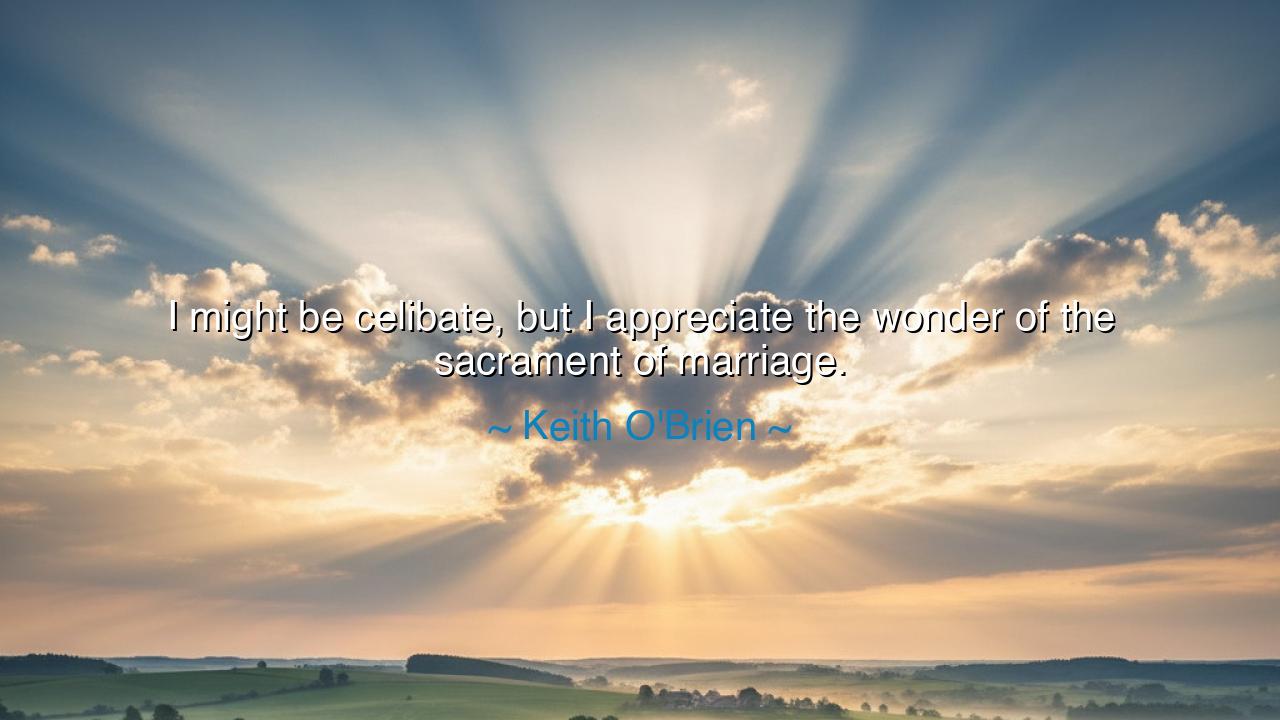
I might be celibate, but I appreciate the wonder of the sacrament






“I might be celibate, but I appreciate the wonder of the sacrament of marriage.” Thus spoke Keith O’Brien, a man who, though he walked the path of celibacy, did not close his eyes to the beauty of that union which binds two souls as one. In these words, there is no contradiction but harmony: for celibacy and marriage, though different roads, both spring from the same source of devotion. One dedicates the heart entirely to God, the other joins two hearts in a covenant that reflects divine love. Both are sacraments of giving, of sacrifice, of transcendence beyond the self.
The ancients knew well the sanctity of covenant. In their rites and traditions, they saw in marriage not merely the joining of flesh, but the joining of destinies. In the Christian faith, it was elevated to a sacrament, a visible sign of invisible grace. The bond of husband and wife became a mirror of Christ’s love for His Church—faithful, enduring, and sanctifying. O’Brien, though renouncing marriage by vow of celibacy, honors its sacredness, seeing in it not something to be dismissed, but something to be revered, like a jewel that shines differently under the same sun.
Indeed, history offers us luminous examples of this dual reverence. Consider St. Augustine, who wrote of both the virtue of celibacy and the holiness of marriage. Though he exalted virginity as a higher calling for some, he never scorned the married state. Instead, he called it “the bond of love,” a partnership where man and woman together fulfill divine purposes in family and community. Here we see the same spirit as O’Brien’s words: a recognition that holiness wears many garments, yet all are woven from the same loom of love.
To appreciate the sacrament of marriage, even while not partaking in it, is an act of humility and wisdom. It is to look beyond one’s personal path and see the sacredness in the choices of others. O’Brien’s statement reminds us that one need not live a thing to honor its beauty. Just as the monk who has never held a sword may still admire the courage of the warrior, so too may the celibate admire the sacrificial union of husband and wife. Such reverence enlarges the heart and keeps envy, scorn, and narrowness far away.
But why call marriage a wonder? Because in it lies a mystery that transcends human reason: two distinct beings choose to surrender their solitude and become one flesh, one household, one destiny. In its joys and in its trials, marriage reveals the deepest truths of love—that it is not a fleeting passion, but a daily act of will, a sacrifice made again and again. In its endurance lies its wonder: that imperfect humans can build something enduring, even eternal, from their fragile lives.
The lesson for us, then, is to cultivate reverence for what is sacred, even when it is not our own path. Whether one is married, single, or celibate, there is wisdom in honoring the choices that others make in pursuit of love, faith, and holiness. To scorn marriage because one has chosen celibacy, or to scorn celibacy because one is married, is to misunderstand the breadth of the divine. Each path, rightly lived, reflects a different facet of the eternal flame.
Practical wisdom follows: if you are married, live your union as a sacrament, not a mere contract. Honor your spouse with patience, forgiveness, and fidelity. If you are single or celibate, let your life still be rich in reverence for the bonds others hold sacred, supporting them with encouragement and respect. And in all states of life, remember that love is the root of every sacrament—the love of God, the love of neighbor, the love that transcends self.
Thus O’Brien’s words remind us that true wisdom is not confined to one path alone. The wonder of marriage can be cherished by all, for it teaches us about devotion, sacrifice, and unity. Let us walk our own road faithfully, but with eyes open to the beauty of other roads. In doing so, we will see that all are paths leading, in their own way, toward the same horizon of divine love.






AAdministratorAdministrator
Welcome, honored guests. Please leave a comment, we will respond soon